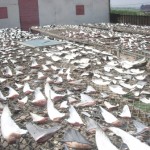Kim Bosco Mo has a piece in Huff Po Canada today on whether banning shark fin soup is an equitable way to protect sharks. I would have answered in a comment on their site but it limits the comments to 250 words and requires you grant HP access to your Twitter account AND set up an account with them (WTH HuffPO?), so I am posting my response here instead.
While it seems his heart is in the right place (“Any effective measures that protect our valuable ocean resources … will get my vote”) the article is based on some terribly ill-informed and nonsensical arguments. The statement “Many commercial fishing vessels will, as normal practice, retain the entire shark body as it has many uses.” shows ignorance of the problem, which is that the fins are so much more valuable than the rest of the carcass that this is precisely NOT what the offending vessels do. If the boat can carry two tons in the hold, then 2 tons of fins is worth way more to the fisher than 2 tons of whole sharks; that’s the whole reason finning exists in the first place!
He asks if it is equitable to ban shark fin soup and instead “Shouldn’t we go after those unscrupulous operators who engage in illegal activities to chase fast profits?” Yes, and finning is already illegal in Canada, but it is not enough. If the soup is the whole reason finning occurs and you take away the market, then there ceases to be motivation for the undesired practice. The bigger question we should really be asking is “Is the cultural practice of eating this one flavour of soup worth destroying a whole class of vertebrates for, or can we encourage cultural practices to evolve to a more harmonious balance with nature?“. If the answer is no, or the argument is taking too long, then it becomes necessary to stop it through legislative measures before it’s too late, which is how proposals to ban shark fin soup or possession of fins arise.
Mr Mo argues that it’s inequitable to ban finning if we don’t ban bluefin tuna fishing as well. Well, yeah, we probably should do that too, since bluefin have been decimated by overfishing and are commercially extinct in some places and headed that way in others. He is right that bluefin are incredibly valuable, it’s called EXTINCTION ECONOMICS, and the same will happen to sharks as we fish them down to zero too, if we’re not careful. The fins are already vastly more valuable than they were.
His final argument that shark fin consumption in the US and Canada is insignificant next to that in Asia, so banning it in Nth America will not help is, frankly, absurd. Obviously, every shark saved is a win! Just because there are worse offenders doesn’t mean we should keep on with a culinary practice that encourages a despicable and repugnant fishing activity. John Wayne Gacy killed more folks than Dahmer but it doesn’t mean Dahmer’s kills were any less significant; except for the top spot, there’s always a bigger fish, so that is no kind of argument. When it comes to fomenting cultural change, you can only change what you have influence over, so you start at home where change is most feasible, and then you lobby other nations to change their practices until you create a global movement. I suspect, and am not afraid to hope, that the practice of eating shark fin soup and the awful fishing method it has spawned are on the way out, and like most slow revolutions it will take place inexorably, one fin at a time, everywhere.
If you want to know more about finning and the shark fin soup controversy, Southern Fried Science has covered it extensively






“John Wayne Gacy killed more folks than Dahmer but it doesn’t mean Dahmer’s kills were any less significant.”
Au contraire. Gacy was a killer in the finest sense of killers while Dahmer was just a rank opportunist and crazy to boot.Your article is based on some terribly ill-informed and nonsensical arguments which shows ignorance of the problem of mass killers in our midst.
But back to sharks. Great points. Shouldn’t we have SOME sort of debate about shark fins outside of the conservation hyperbol that is all too familiar?
Like, maybe, certified fins (gasp), or a fin trade of some kind (double gasp). No one in the conservation space has yet to come up with an answer to the legal challenges pushing back against these bans, San Francisco for example.
Articles like Kims open the floor to discussion ill informed or not. Like complex eco systems there’s no one solution to shark fin, any debate will deliver alternate solutions to this very complex issue.